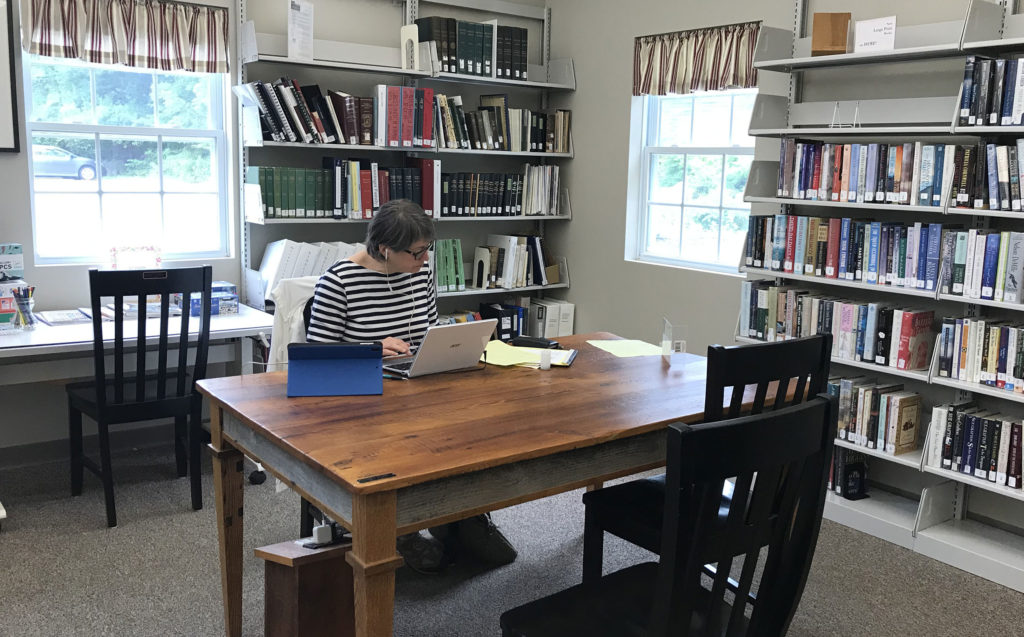On June 25, 2019, Island Institute staff facilitated a meeting co-hosted by the Maine State Library and held at the Rockland Public Library to discuss the digital inclusion work happening in libraries throughout Maine. Attendees representing fifteen libraries from Washington County to Wells, Maine, shared experiences and exchanged resources for meeting the needs of communities in a world increasingly dependent on the internet.
Through our work with coastal and island communities, the Island Institute has identified that improved access to high-speed internet is an essential tool for attracting and maintaining year-round populations and encouraging economic growth in line with the culture of coastal communities. Supporting digital literacy initiatives is a key component of our broadband work.
Over the past few years, we have partnered with the National Digital Equity Center (NDEC) to provide training in island and rural coastal communities on topics such as small business accounting software, website development, Microsoft Excel, and social media. However, many of these communities also identified the need to reach those with more basic literacy needs, such as setting up email, “facetiming” with loved ones, or using the internet safely. This is where libraries are playing a critical role.
As the American Library Association puts it, “Today’s public libraries are technology hubs that millions rely on as their first or only choice for Internet access. Libraries are essential to ensuring access to educational, entrepreneurial, and employment resources.”

Island Institute
Participants exchange ideas and resources at the Digital Literacy Meeting hosted by Island Institute at the Rockland Public Library on June 25th.
The library exchange meeting proved that this statement rings true here in Maine. One important take-away from the meeting was that the one-on-one technology assistance being offered at libraries is highly popular and meeting a real need in both small and large communities. In the greater Brunswick area of 25,000 people, Curtis Memorial Library has a robust technology and training program that utilizes staff and volunteers to provide several hours of one-on-one tutoring each week in addition to offering classes and technology book groups.
Meanwhile in Bremen, with its year-round population of under 800, librarian Yvonne Gloede just recently recruited a volunteer to offer drop-in tech tutoring for a couple hours every other week. As she shared with the group, the few sessions so far have been a big success. “Patrons were waiting in the parking lot last Saturday when I arrived fifteen minutes before opening. It’s the best way to get people in the door to discover other services we offer besides our great books.”
In addition to sharing stories of work currently happening, participating libraries learned at the meeting about new courses being offered by the NDEC around “Aging Well with Technology.” These digital literacy initiatives will play an important role in continuing to engage Maine communities on the topic of broadband.*
Jared Leadbetter of the Maine State Library commented after the meeting the he was “reminded that our best resources are always the people around us” and that the stories shared were “a reminder of how much incredible work is happening in Maine libraries despite the lack of resources such as formal training and access to reliable broadband.”
Chris Suggs, an Americorps digital literacy volunteer serving in Washington and Hancock counties also praised the work being done in rural libraries, pointing out that with “peer-to-peer tutoring there’s a multiplier effect.” He hopes to see more of this work happening with the help of volunteers, and he reminded the group that you don’t have to be an expert to step in and help decrease the fear and intimidation people feel around technology. “Remember,” he said, “The internet can be fun too!”
We encourage readers to find out what your library is doing to meet basic digital literacy needs, and consider volunteering to help empower others in your community.

Island Institute
The library on Monhegan Island.
*Additional notes from the National Digital Equity Center
Benefits of increasing digital literacy
- Leads to higher take-rates, as people understand the value of an internet connection to their lives, they are more likely to take service
- Reduces barriers to adoption and helps community members access learning tools for increased on-line presence
- People with service are more likely to upgrade service, again increasing the viability of a project being successful
- Helps businesses understand how to leverage on-line tools and cloud services to add value and productivity to their business
- Helps individual community members access life enhancing content, including e commerce, telemedicine services and educational opportunities
- Bridges the Digital Divide, helping teach disadvantaged members of the community to participate in what is increasingly an online world


